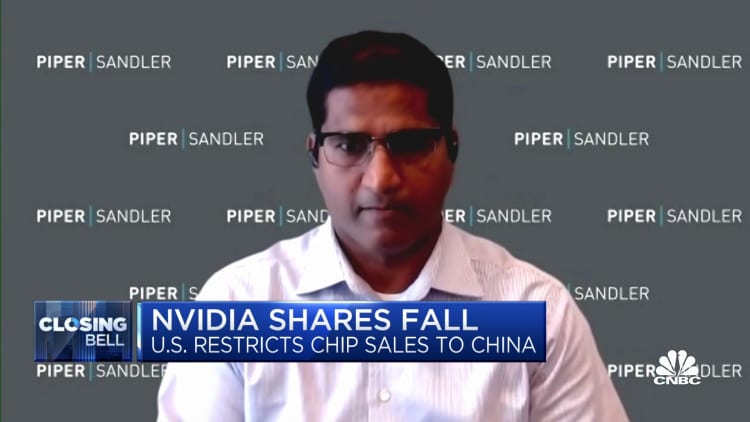China’s electric car firms, which rely heavily on Nvidia, are safe from the U.S. chip ban — for now
Nvidia has found success in China by selling automotive chips to the country’s electric car companies. But the U.S. semiconductor giant has been restricted from sending some products to China. So far, electric vehicle makers do not seem to be affected.
Budrul Chukrut | Sopa Images | Lightrocket | Getty Images
BEIJING — U.S. restrictions on Nvidia chip sales to China won’t affect Chinese electric car companies, as they’re using auto systems that don’t include the sanctioned products.
Chipmaker Nvidia’s shares have plunged around 13% this week after the company disclosed new U.S. restrictions on its exports to China, affecting about $400 million in potential sales in the current quarter.
In China, the Nvidia Drive Orin chip has become a core part of electric automakers’ assisted driving tech. These semi-autonomous driving systems are an important selling point for the companies in what has become a fiercely competitive market in China. Some automakers are also using Nvidia’s Xavier chip. Automotive is a relatively small but fast-growing part of Nvidia’s business.
However, the new U.S. restrictions target Nvidia’s A100 and H100 products — and these chips’ sales are part of the company’s far larger data center business. The products are graphics processors that can be used for artificial intelligence.
“There shouldn’t be any restrictions on Xavier and Orin, and Xpeng, Nio and others would continue to ship with those chips,” said Bevin Jacob, partner at Shanghai-based investment and consulting firm Automobility.
Jacob, however, did warn that there could be “close scrutiny” in the future on U.S. firms shipping chips relating to artificial intelligence and autonomous driving to China.

Xpeng declined to comment. Nio, Li Auto, Huawei and Jidu — a new electric vehicle brand backed by Baidu and Geely — did not respond to requests for comment.
The new U.S. rules are designed to reduce the risk of supporting the Chinese military, according to the U.S. government, Nvidia said in its filing with the Securities and Exchange Commission on Wednesday. But it’s unclear what prompted this specific policy move or what could drive future ones.
In another positive sign for the chipmaker, the U.S. will allow Nvidia to continue developing its H100 artificial intelligence chip in China, the company said Thursday.
“The U.S. government has authorized exports, reexports, and in-country transfers needed to continue NVIDIA Corporation’s, or the Company’s, development of H100 integrated circuits,” Nvidia said in a filing Thursday.
The company said second-quarter revenue for its automotive business was $220 million, up 45% from a year earlier.
“Our automotive revenue is inflecting, and we expect it to be our next billion-dollar business,” Nvidia CEO Jensen Huang said in an earnings call in late August, according to a StreetAccount transcript.
WeRide, an autonomous driving technology start-up, said in a statement that “there is no immediate impact from the ban.”
“We believe both the supply and demand side in the industry will work closely together to handle the constantly changing business environment to safeguard the continuous development of technology,” the company said in a statement to CNBC.
Pony.ai, another autonomous driving start-up, said it is not affected, as did automaker Geely.
— CNBC’s Kif Leswing contributed to this report.
For all the latest Automobiles News Click Here
For the latest news and updates, follow us on Google News.

